5 quotes from everyday Greeks that might really scare Malaysians

- 388Shares
- Facebook380
- LinkedIn1
- Email1
- WhatsApp2
If you’ve as much as glanced at the news lately, you would definitely have seen something about Greece going bankrupt. “Bankrupt” quite a super-oversimplification but, in a very simple nutshell, Greece has reached a point in their economy where the government has borrowed more money than it can afford to pay back and has, in fact missed a payment to the International Monetary Fund (sorta like a world bank, but not really).
To put things in perspective; if this happened to an individual that person would be publicly declared a bankrupt and will have to hand over control of their finances to an external party whose only focus is to make sure you repay your debts. So, imagine if these conditions are imposed on an entire country? It sounds like quite a Greek Tragedy.
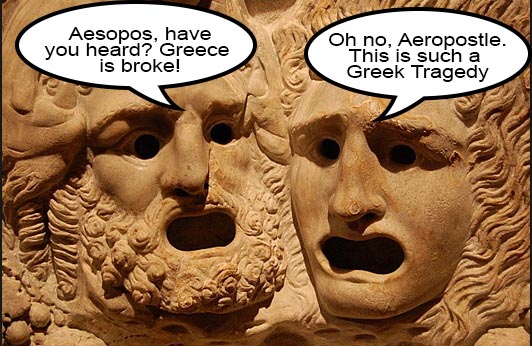
But as Malaysians started reading more about the Greek government-debt crisis (official name), they started drawing parallels to events which are happening at home. You might have seen something like this floating around on social media:
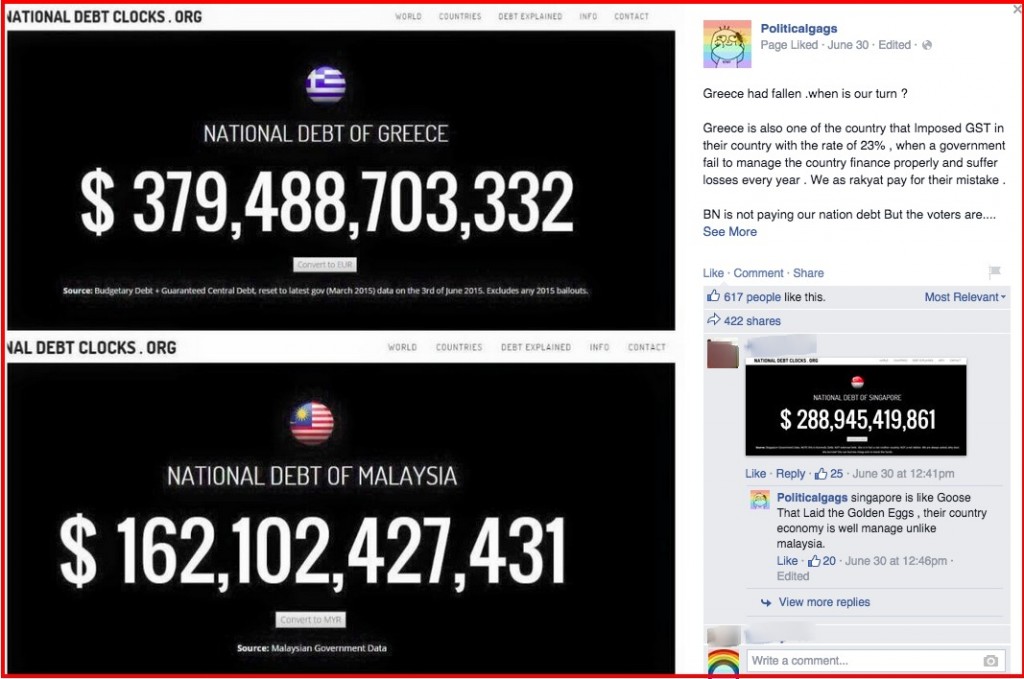
We’ll go into how valid these fears are later on in the article, but let’s just say we don’t blame people for being worried – the more we read about what happened to Greece, the more eerily disconcerting the similarities become.
1. “All of them wanted a job in the public sector … I told them [to go] out in the world. Do something productive in the real economy – But they just weren’t interested.” – Nikos Sofianos, entrepreneur, as quoted in BBC Radio 4.

Greece has a pretty interesting problem when it comes to civil servants – or government servants as we Malaysians like to call them. You see, in Greece, no civil servant has been laid off for over a century due to a law in the Greek Constitution. Before the law, newly-elected governments would sack all the civil servants from the previous government in order to use their own members.
Unfortunately, this law resulted in successive governments just adding their own people to the workforce with every change. Even those who commit white collar crimes are guaranteed an appeal during which they are able to remain at work. To give you an idea of how bad this is, here’s an account of a government agency which was set up to drain a lake way back in the 1950’s. While the project was completed in 1957, the agency still exists with 30 employees and still advertises for new workers despite the head of Greece’s audit office having “no idea what they do”.
So imagine the slacking off that happens… leading to a bloated, inefficient public sector.
While the Greek government has started an exercise to trim down the civil service due to pressure from their creditors, citizens were so outraged that they started rehiring many of those retrenched – some by creating “new” divisions within existing agencies.

How much does it cost Greece to pay salaries and (overly generous) pensions a month? Two BILLION Euros (RM8.39 billion). The Malaysian government currently spends about RM5 BILLION a month, though for a slightly larger workforce and it isn’t clear if this includes pensions. We’ll talk about those numbers in another point below.
While Malaysia has started freezing new civil service jobs in favor of pushing job opportunities towards the private sector – a good move, BTW – the ACTUAL question, as with Greece, is that it’s not the number of people in the workforce; but whether the people hired are efficiently utilized or are just there to keep unemployment numbers down.
2. “My husband is thinking of writing the word [Stupid] on his forehead in very big letters. He has come to the conclusion … because he has been honest [with the tax department]” – Stelios’ wife, as quoted in BBC Radio 4

Gomen tax 101: Governments rely on taxpayer money as a form of income. The less tax being paid, the less a government has to spend to like, build roads, pay off debts, and stuff.
While some of us Malaysians might question how the gomen spends our tax money, the Greeks take it a step further by considering tax to be a form of theft. The Greek aversion to taxes stems from it’s long occupation by the Ottoman Empire, during which tax evasion was considered a form of patriotism. The Greek tax evasion game has even been called a “national sport,” with tax officials resorting to helicopters and Google Earth to spot houses with swimming pools. What they found were 16, 974 pools compared to the declared 324.
Over the years, Greeks owe the government about 76 billion Euros – mostly since 2009.
But the problem isn’t just tax evasion. Remember how we said we’d talk about the numbers of civil servants in the first point? Well, here it is.
Greece has a workforce of 4.3 million people, out of which 1 million are in the public sector, 2 million in private sector, and 1.3 million are self-employed. This means that the brunt of the taxes come from the 2 million in the private sector. However, as you might guess (hint: the header), the number that actually pay taxes are much, much smaller – an estimated 300,000.
As a way to directly collect more taxes, the Greeks introduced a form of tax which many Malaysians are familiar with by now:
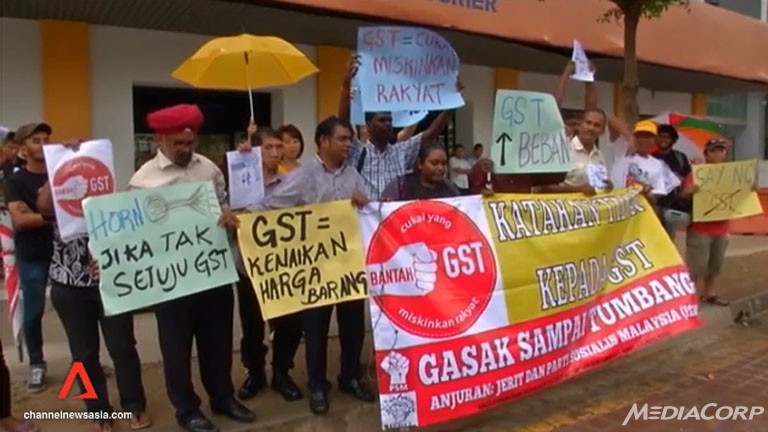
But even then, Greek businesses have come up with a really simple way to avoid that: By charging cheaper prices to customers who don’t ask for a receipt.
Don’t get any ideas, ugaiz.
3. “In the past, bribes ensured a degree of efficiency. Now nothing works.” – Greek senior citizen, as quoted in The Guardian.

The core of Greece’s current problems are attributed by various sources (here’s two) to a non-transparent and inefficient public sector and deep-rooted corruption. These two factors are usually inter-related: it’s harder to hide corruption in a transparent government, and an efficient government provides less opportunities for bribes.
If read that last sentence while thinking “If Malaysian police more efficient then they’ll be stopping me more often to ask for kopi money. Stupid CILISOS.” then you’re not thinking corrupt enough, yo. In a story related by The Guardian (paraphrased by us):
A lift technician got a pretty big shock when he accessed the lower shaft of an elevator at Athens’ largest public hospital. The technician landed knee-deep in a pile of small envelopes used to transfer bribe money – all conveniently discarded by the doctors who received them.
The level of corruption in the Greek medical industry is so bad that instead of “No Smoking” signs, some hospitals in Greece have “No Bribery” signs. Here’s a list of scandals involving contracts for medical supplies and here’s a price guide for bribing doctors.

And that’s just one aspect of it.
In terms of transparency, Greek politicians have been promising (and even starting) transparency initiatives to keep citizens in the loop in order to keep the government accountable for how money is being spent. However, results have been, um… less than satisfactory; with the World Bank and Transparency International ranking Greece’s corruption levels on equal grounds with Cuba, Jordan, Italy, and…… Malaysia.
Well, at least we don’t have to pay bribes to see a doctor in government hospitals.
4. “The problem in Greece is that we have been overspending and we have been spending money that was not ours.” – Panagiotis Georgalas, business owner, as quoted in CNBC
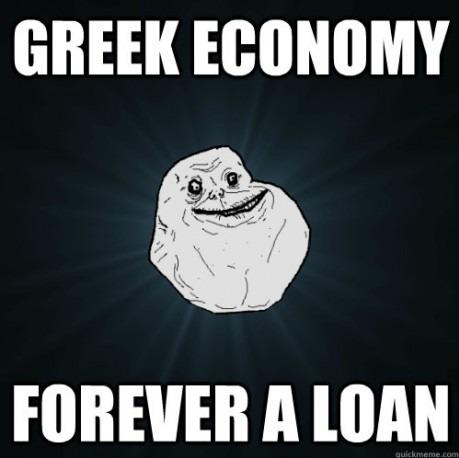
Hoooooooboy. The debt. This one’s the most discussed aspects of the Greek Crisis, so we promise we won’t make this too long. However, you need a quick refresher, here’s an article that gives you the background in less than 100 words.
It’s been noted that Greece’s financial difficulties have been ongoing for quite some time, even before they became a part of the European Union. The cause of these difficulties are said to be rooted in politics and culture.
In a nutshell, Greece’s policies are the result of years of previous government administrations making policies that kept them popular but were financially irresponsible. With super-generous pensions and insane worker benefits (You can retire as early as 40!) coupled with the high rate of tax evasion, the Greek government had been historically spending much more than it earned.

Culturally, the words commonly used to describe the more negative aspect of the Greek mindset are “Entitlement” and “Dependency”. At risk of sounding like a broken record, the generations of Greeks have grown used to “how things work” with a heavy reliance on the government for jobs, a government that encourages the people to rely on it, and, when fit hits the shan, start throwing blame on the government, or, in the current situation, Germany. As a prominent Greek journalist puts it:
“People, especially young ones, are not taught to love entrepreneurship, but to hate it. … This is the mind-set now … It’s a culture of dependency, first on parents, and it becomes a dependency on the state.” – Takis Michas, Journalist, as quoted in the Los Angeles Times.
That quote was made in 2010, when the first cracks in Greece’s foundations started showing. And now that the cracks have become full-on sinkholes…
5. “I notice us, arguing endlessly, everyone supporting their stance fervently, ego dominating minds and words, while having no clue as to what is really at stake.” – Iliana Magra, quoted in a letter written to FT.com

With Greece’s creditors only willing to offer more help if Greece accepted their conditions to impose even tighter control over their spending and finances (smart people word: “Austerity“), the Greeks did something surprising during an election earlier this year – they voted in the Syriza, which is a radical left-wing party that, among other things, opposes accepting the austerity measures ← Important point
But as months passed by with no conclusion in sight and talks about a referendum to get Greek citizens to decide on whether or not the government should accept the austerity measures, the population started dividing themselves into “YES” and “NO” camps. If it’s a YES, the Greeks won’t default on their debts but would have to give up many of the perks they’ve been used to for years till the debt’s settled. If it’s a NO, the Greeks would default on their debt and face the possibility of being kicked out of the EU.
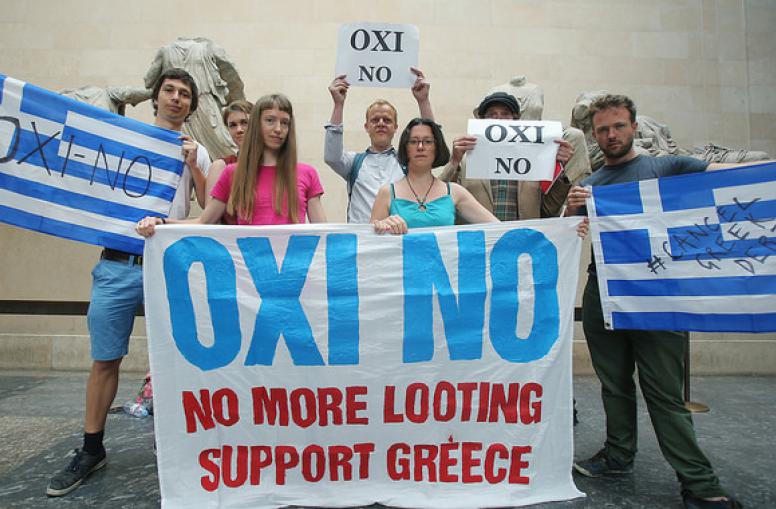
But this is where some admit that they weren’t given enough information. Instead, what they get is nationalistic arguments, that the other European countries were trying to humiliate and/or blackmail Greece, or that it’s all a Zionist conspiracy (poor Zionists).
“It was an easy question: Do you want more austerity? Of course not. … The vote is almost meaningless…we need another deal. … They made it about nationalism, they didn’t explain the consequences.” – Angeliki Planoudaki, Greek citizen, as quoted in CNN Money
As you might expect (or have heard), over 60% of Greeks voted “NO,” though financial and political analysts say the referendum was not just pointless to begin with, but also puts Greece at a far worse situation. Except that now, the Prime Minister can blame the people if things get worse. You can read on the why here.
“So will Malaysia become like Greece?” – Malaysians, as made up by CILISOS.
Before we head to the answer (sorta), what do you think?
To wrap our heads around the subject, we spoke to:
- Goh Wei Liang – a consultant and blogger
- Anonymous 1 – an equity and derivatives trader
- Anonymous 2 – a bank manager
- FreeLunch – a former auditor whom we now owe 3 lunches for his help
We’re collectively referring to them as our BFFs (Banking/Finance Friends) because finance and economics are… Greek to us.
The general consensus from our BFFs is that the answer’s…

The major difference is that a lot of Greece’s debt is external, to foreign banks and countries while Malaysia’s debt is internal, meaning that it’s owed to local entities (so it’ll be easier to renegotiate conditions if the government has trouble paying). Also, all point out that we can’t just look at debt as a giant number where “If it reaches Greece’s debt then we become like Greece”. Instead, the BFFs point to a debt-to-GDP comparison which measures how much a country owes versus how much it produces. Good news is, we’re pretty okay in that regard.
However, they all warn that we could be headed in that direction if we aren’t careful. One major problem facing us right now is political stability *cough1MDBcough*. We can’t go into too much detail due to space constraints, but the main thing we’d want to address here is the devaluation of the Ringgit.

In some cases, the devaluation of a currency can be a good thing in order to attract investors as well as increasing export (because prices are now cheaper). In fact, some countries devalue their currency on purpose for this reason. But here’s the thing… As part of the EU, Greece can’t devalue its currency even if it wants to. This has been noted to be one of the reasons why some analysts think it was a mistake for Greece to join the EU, since they can no longer compete against highly productive EU nations such as Germany.
So you might be interested to note that Malaysia is part of a 10-nation ASEAN arrangement to form a single market modeled after the European Union that is due to happen by the end of 2015.
A senior EU ambassador has urged the ASEAN member countries to “not copy the EU common market concept,” adding that the EU has proved that a single market concept can bring economic advantages to its members but ASEAN can also learn from their mistakes. Good news is that there will be no plans for a single currency in the ASEAN version in the near future.
And in any case, as a few of our BFFs pointed out, we have a whole lotta natural resources at our disposal which can be used to offset the debts. But who needs rainforests anyway, right?
- 388Shares
- Facebook380
- LinkedIn1
- Email1
- WhatsApp2



